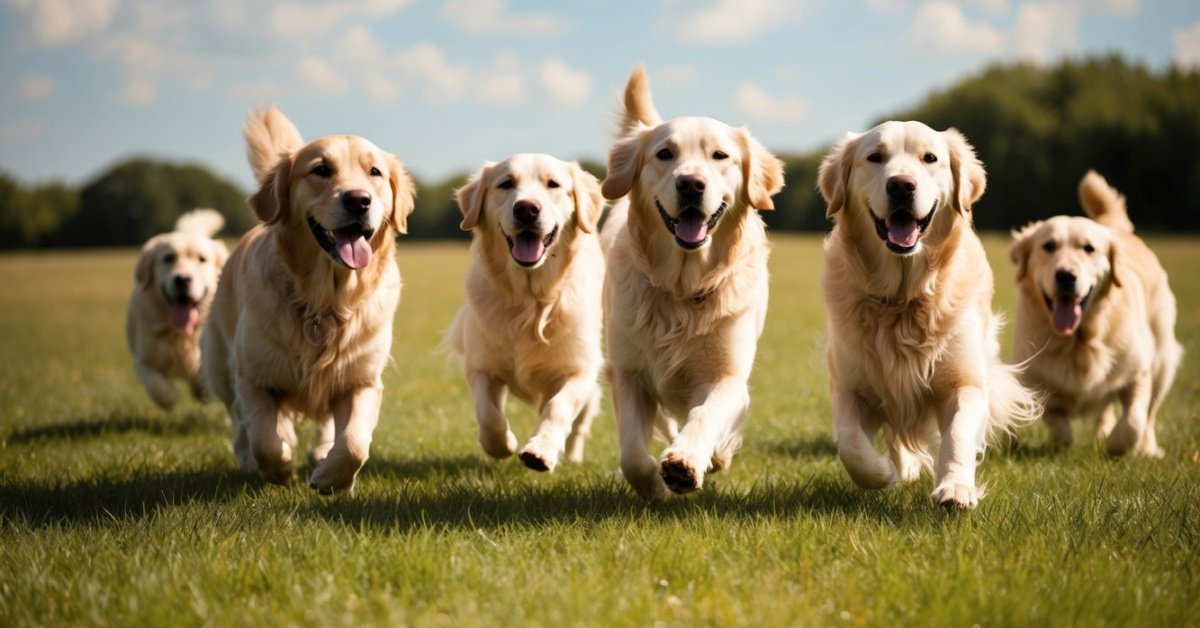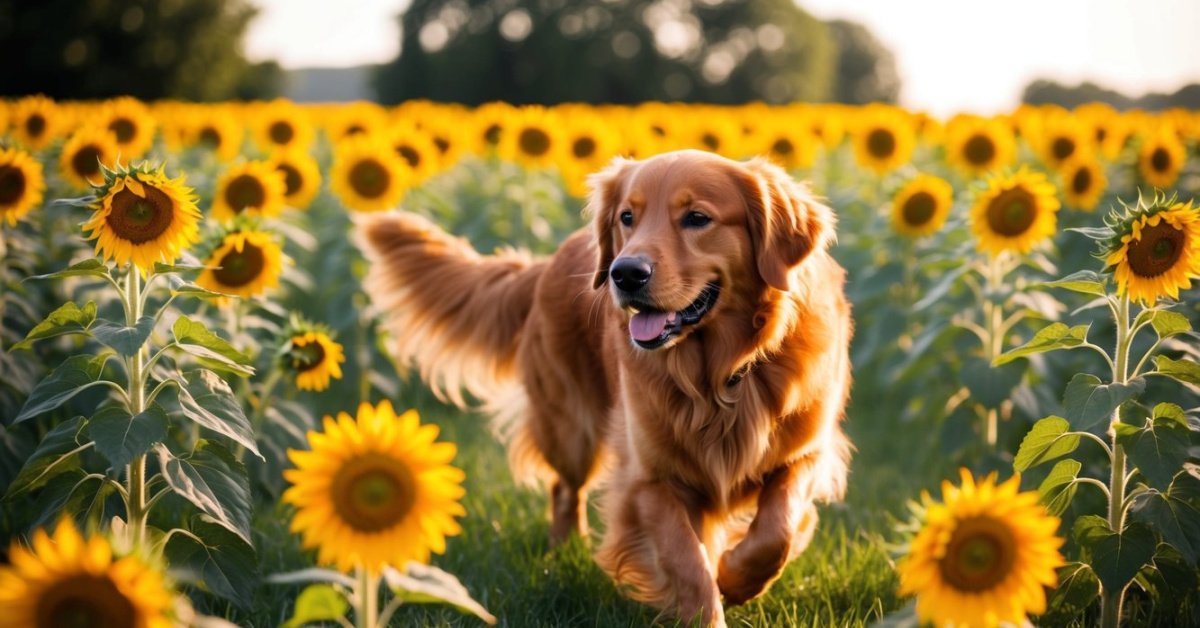Key Takeaways
- Friendly Yet Alert: Golden Retrievers combine a friendly demeanor with an inherent alertness, making them capable of serving as effective watchdogs, even if they lack the aggressiveness of traditional guard dogs.
- Loyalty and Bonding: Their strong loyalty and ability to bond closely with families drive their protective instincts, urging them to protect their loved ones in critical situations.
- Physical Attributes: With a strong and athletic build, Golden Retrievers can physically deter intruders while maintaining a friendly appearance that often disarms potential threats.
- Strengths and Limitations: While they exhibit strengths like alertness and trainability, their non-aggressive nature and sociability may limit their effectiveness as traditional guard dogs.
- Alternative Breeds: For those seeking more conventional guard dogs, breeds like German Shepherds, Doberman Pinschers, and Rottweilers offer robust guarding capabilities alongside affectionate natures.
- Key Factors for Selection: When choosing a guard dog, consider factors such as temperament, size, energy level, intelligence, and the dog’s ability to integrate into family life for optimal protection and companionship.
Golden Retrievers are known for their friendly demeanor and playful spirit, but have you ever wondered if they can also serve as effective guard dogs? While they might not fit the traditional mold of a fierce protector, there’s more to these lovable pups than meets the eye.
Overview of Golden Retrievers
Golden Retrievers exhibit a unique blend of friendliness and intelligence, making them popular family pets. Their characteristics spark curiosity about their guarding capabilities.
Temperament and Personality
Golden Retrievers possess a gentle and friendly disposition. They’re known for their loyalty and ability to bond with families and individuals alike. Their playful nature encourages high energy and sociability, which might dissuade some from considering them as guard dogs. However, their alertness and willingness to protect loved ones can surface in critical situations. They often display an instinct to alarm bark, signaling to families when something feels off, even if it’s not aggressive behavior.
Physical Attributes
Golden Retrievers boast a strong, athletic build with a well-proportioned frame. Their weight typically ranges from 55 to 75 pounds, depending on gender and lineage. Their golden, water-repellent coats come in various shades, adding to their appeal. With their powerful jaws and keen senses, they can physically deter intruders while also retaining a friendly expression. This combination of strength and approachability makes them versatile companions, balancing both their active lifestyle and an innate protective instinct.
Guard Dog Characteristics
Understanding the unique qualities of guard dogs is essential for evaluating their suitability. While Golden Retrievers are known for their friendly demeanor, some traits can contribute to their effectiveness as protectors.
Definition of a Guard Dog
A guard dog is a canine trained to protect its owner, property, or livestock. Guard dogs often have a keen sense of awareness, alertness, and an instinct to react to potential threats. While many associate guard dogs with aggressive breeds, it’s crucial to recognize that this role can manifest in various ways, including through loyalty and protective instincts.
Essential Traits of Good Guard Dogs
Good guard dogs exhibit several essential traits:
- Alertness: They remain attentive to their surroundings, ready to detect unfamiliar people or sounds.
- Loyalty: They form strong bonds with their families, providing motivation to protect what they love.
- Intelligence: They learn commands and training quickly, essential for responding appropriately in various situations.
- Confidence: They show a calm demeanor in the face of potential danger, projecting an aura of strength.
- Barking Instinct: They vocalize to alert their owners of any disturbances, signaling the need for caution.
Golden Retrievers, while not traditional guard dogs, can demonstrate these characteristics. Their unique blend of friendly nature and instinctual awareness offers a different approach to companionship and protection.
Are Golden Retrievers Good Guard Dogs?
Golden Retrievers offer a mix of traits that can surprise many when considering them as guard dogs. They blend friendliness with an innate watchdog instinct, making them unique guardians.
Strengths as Guard Dogs
Golden Retrievers possess several strengths that contribute to their guarding capabilities:
- Alertness: Golden Retrievers often display sharp senses, quickly responding to unusual sounds or movements.
- Loyalty: These dogs form strong bonds with families, leading them to instinctively protect their loved ones.
- Intelligence: Their high trainability enables them to follow commands and adapt to various situations.
- Barking Instinct: While not aggressive barkers, they typically alert owners when sensing something off, making them effective watchdogs.
- Friendly Demeanor: Their gentle nature can work in favor, as it often makes intruders hesitant, unsure if they’re facing a fierce protector or an amiable dog.
Limitations as Guard Dogs
Despite their strengths, Golden Retrievers do have limitations:
- Non-Aggressive Nature: Their friendly disposition often leads to a lack of aggression, which may not deter potential threats.
- Socializing: With a playful attitude, they may not be protective if they perceive intruders as friendly.
- Risk of Over-Familiarity: They may greet visitors with enthusiasm rather than suspicion, diminishing their guarding role.
- Size and Build: While strong, their physical appearance doesn’t reflect the intimidating presence some traditional guard dog breeds have.
- Training Needs: Effective guarding may require additional training and reinforcement, more than what is typically expected of them.
Golden Retrievers can protect families in their unique way, contributing to safety through alertness and loyalty while also embodying friendliness and companionship.
Alternatives to Golden Retrievers
I’ve seen many breeds step up as fantastic companions and protectors. For those considering alternatives to Golden Retrievers as guard dogs, here are some breeds that excel in protective roles while still offering friendly dispositions.
- German Shepherds
German Shepherds excel in loyalty and intelligence. They’re commonly used in police and military roles due to their strong protective instincts. Their ability to train quickly makes them ideal for guarding families.

- Doberman Pinschers
« Golden Retriever Clubs in California: A Guide to Unleashing Fun, Friendship, and Furry Favors
Golden Retriever Event Cancellations: How to Keep the Community Spirit Alive Amidst Disappointment »
Dobermans are known for their alertness and confidence. These dogs maintain a watchful eye on their surroundings. They’re also affectionate with their families, striking a balance between protection and companionship.
- Rottweilers
Rottweilers are powerful and courageous, making them excellent guardians. They’re protective of their loved ones and can be gentle with children. Proper training ensures they’re well-adjusted family members.
- Belgian Malinois
Belgian Malinois combine energy and intelligence, making them outstanding working dogs. Their high drive and devotion to their owners make them vigilant and protective. Socialization helps them be both friendly and alert.
- Boxers
Boxers possess a playful and loyal nature, often forming strong bonds with families. While they may not appear as intimidating as some breeds, their barking and protectiveness can deter intruders effectively.
- Bullmastiffs
Bullmastiffs are known for their strength and calm demeanor. Their physical presence can be a powerful deterrent. Despite their size, they’re gentle and affectionate with family members, offering protective instincts.
Each dog breed brings unique traits to the table. Choosing an alternative to Golden Retrievers depends on specific needs and preferences. It’s important to consider temperament, energy levels, and training requirements to find the best fit for a family or individual lifestyle.
Factors to Consider When Choosing a Guard Dog
When choosing a guard dog, several factors influence the decision.
- Temperament: Look for dogs that exhibit protective instincts but also have a friendly nature. Balance is key, as some breeds can be overly aggressive, while others may not show enough concern.
- Size: Larger breeds often provide a more intimidating presence, but size alone doesn’t determine a dog’s ability to be a good guard. Consider how the dog’s size fits your living situation and lifestyle.
- Energy Level: Active breeds require regular exercise and mental stimulation. Dogs with high energy levels can be great for active families but may need more training to channel their energy into appropriate guarding behaviors.
- Intelligence and Trainability: Guard dogs must quickly learn commands and adapt to various situations. Breeds that are eager to please often train well and can be taught to exhibit protective behaviors.
- Socialization Needs: Some breeds thrive in social settings, while others may become territorial. Consider how well the dog will interact with visitors and other pets in the home.
- Health History: Look for breeds with fewer health issues that could impact their performance as guard dogs. Ensure any dog you consider has a good veterinary history, especially if they’ll be working hard to protect your home.
- Previous Training: Investigate if the dog has any existing training. Dogs with foundational obedience training can adapt more easily to guarding duties, making them a more viable option.
- Family Dynamics: Assess how a dog’s temperament fits with your household. Consider how the dog will interact with children, elderly family members, or other pets.
- Living Environment: Take into account the type of home you have. Dogs in apartments might require different characteristics compared to those in larger homes with yards.
By focusing on these factors, I ensure that any dog selected for guarding purposes not only provides protection but also integrates seamlessly into family life. A thoughtful approach to choosing the right breed or individual dog leads to a fulfilling and safe relationship for all involved.
Conclusion
Golden Retrievers may not fit the traditional mold of a guard dog but they offer a unique blend of loyalty and alertness. Their friendly nature can be a surprising asset when it comes to protection. While they might not be the fierce defenders we often think of they can still provide a sense of security through their instincts and strong bonds with families.
If you’re looking for a companion that balances friendliness with a protective edge a Golden Retriever could be a wonderful choice. Just remember that additional training and socialization can help them shine in this role. Ultimately it’s all about finding the right fit for your lifestyle and family needs.














![PetDroid Interactive Dog Toys Dog Ball, [Newly Upgraded] Durable Motion](https://m.media-amazon.com/images/I/41P-nlk1L0L._SL500_.jpg)



